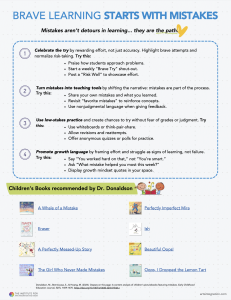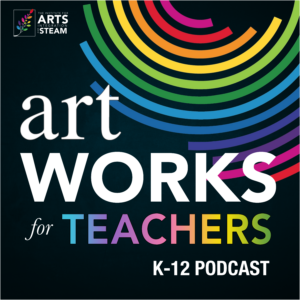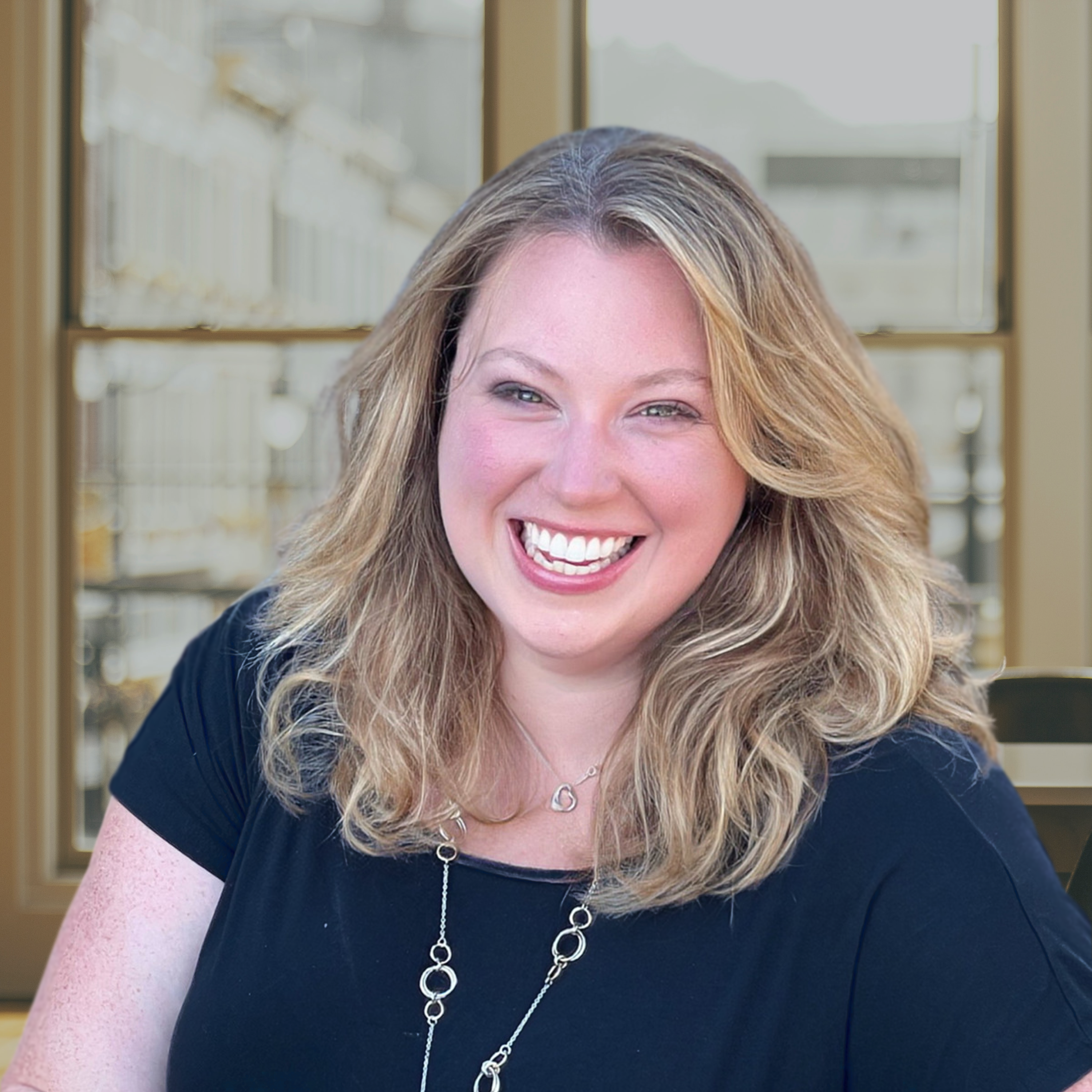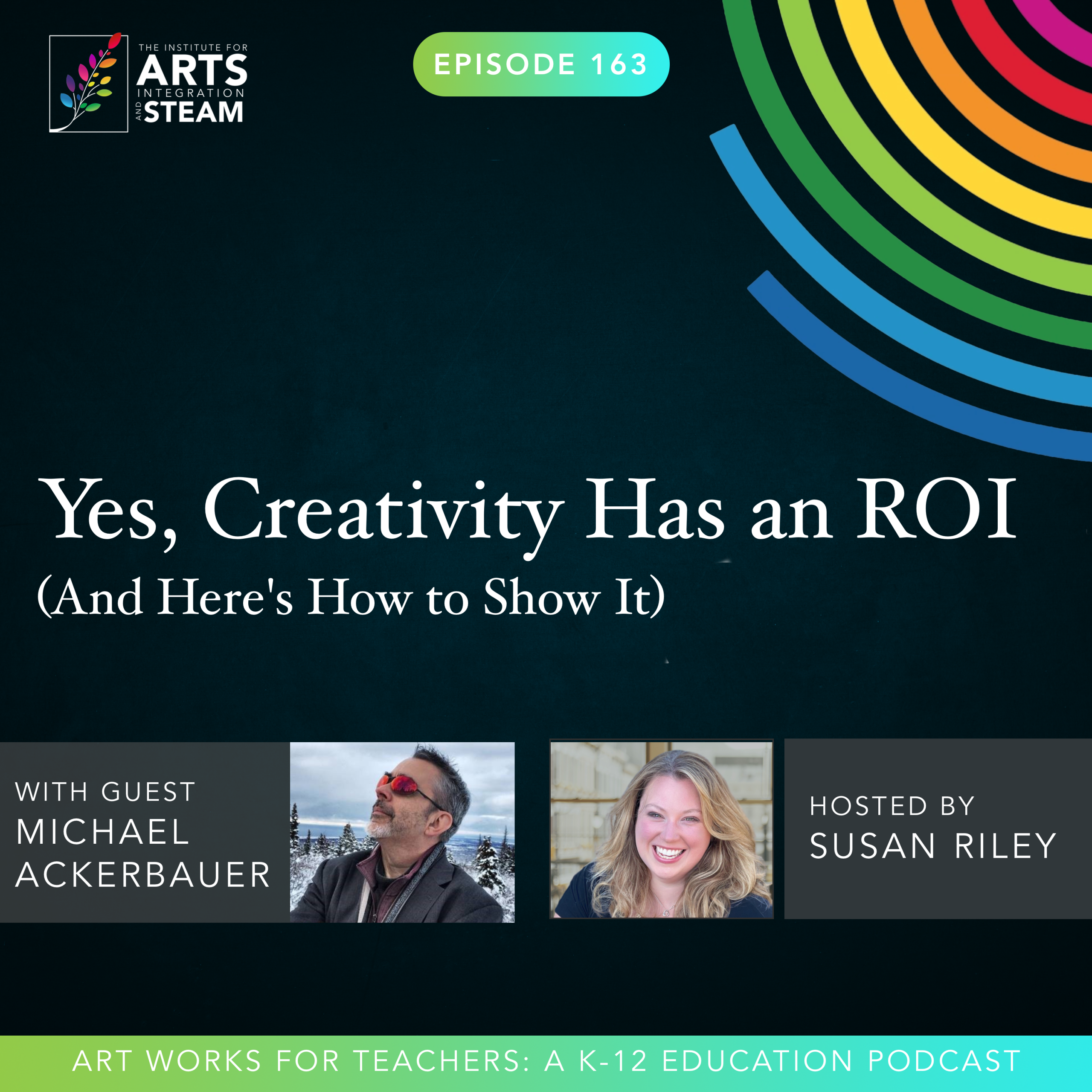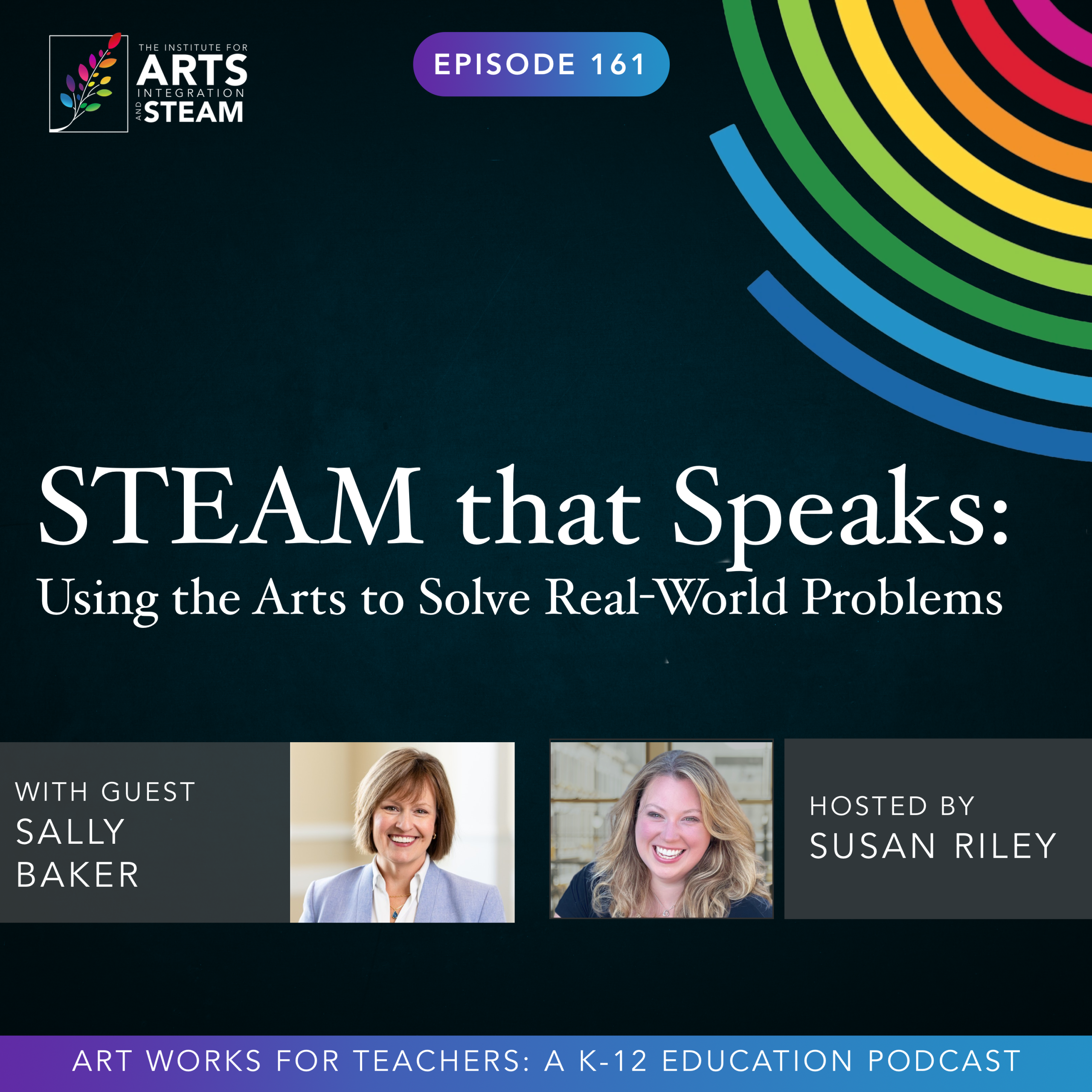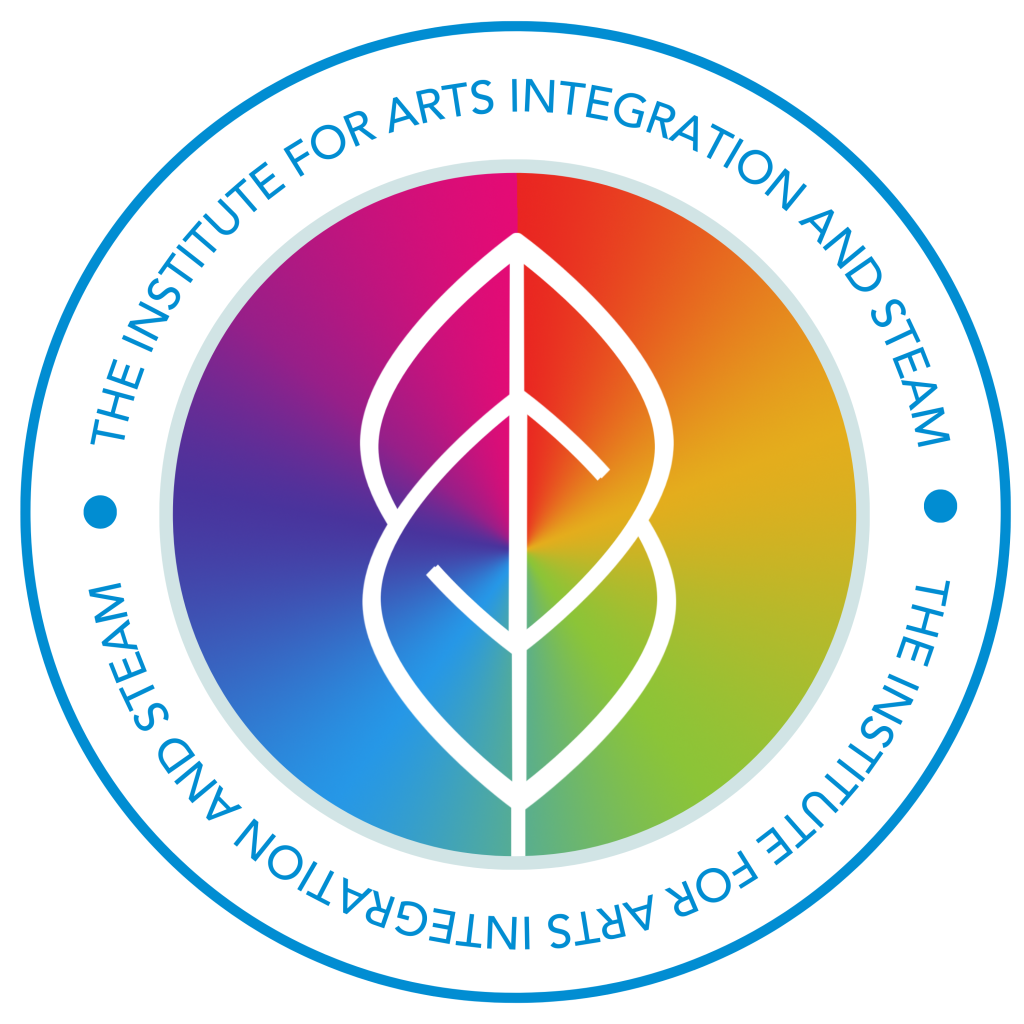ART WORKS FOR TEACHERS PODCAST | EPISODE 131 | 40:04 MIN
Open-Hearted Mistake Making: Shifting from Shame to Curiosity
Enjoy this free download of the Brave Learning resource.
Well, hello, Maleka. Thank you so much for joining me today. I'm excited for our conversation today. So before we dive in, I always start by asking our guests to just tell us your story. Tell us a little bit about your background and how you ended up where you are today.
Maleka
Thank you for having me, I'm happy to be here.
Okay, well, when, I mean, there's a lot of places that you can start. So I grew up in the Midwest, went to college in the Northeast. And when I was younger, like a teenager, I didn't quite know exactly what I wanted to do. I had lots of things I was interested in, studied biology in undergrad and worked in management consulting after graduation. And then spent some time kind of exploring and trying out different things. I felt, I feel like…
Jobs are very theoretical when you're, you know, 12 or something. And so I got to go into some spaces, try things out, and that's how I eventually found my way into early childhood classrooms. I went back to grad school after working with kids and loving it for, even though it's hard work, for several years. But then I got hooked on research. You know, the first semester of grad school, was like, there's a lot more I want to know. So that's…
You know, that's kind of led me to where I am today as an associate professor in education.
Susan
amazing and you focus really on the art of mistakes. I mean, I think that captures a lot of what I know about you and from the research that I've done. And by the way, I think there's something amazing about people who love research because it's like you're a detective almost. It's the super sleuth people, that's what they call it when I started doing it, because you just can't stop digging in, right? I think research can be fascinating, yeah?
Maleka
I agree. I feel like the thing I love is, you know, my friends who are entrepreneurs, I admire them so much. I feel like as a researcher, I get to be innovative, but I have some like structures kind of helping me out for who I am. That works really great. And I can pivot, I can expand, I can chase down things that become curious to me over time and evolve. So it's a good fit for me. I absolutely, one of the things I love the most about being a professor is also teaching and mentoring people into having the confidence to know that they can do this kind of work. And just, again, like I didn't even know what research was when I was an undergrad. I'm trying to make that more available to the students I work
Susan
That's 100 % true. Again, I didn't have that until I went to graduate school as well. And it was in graduate school that I found Arts Integration and through that research. So I think there's so much to be said for that. I want to dive into, though, first your experience as a classroom teacher and how that led you to what you focus on in your research now and talk a little bit more about that.
Maleka (02:51.588)
Absolutely. I was just saying yesterday, I'm a kindergarten teacher forever. That is my heart. I just love young children. love, I just feel like that is really a transitional year along with pre-K. Those are transitional years to kind of get you, get children started in school. And it really sets the tone. And so I had the opportunity to work in a variety of settings. And what I saw was that depending on the culture of the school, the beliefs of the teacher, the resources, do we have paint, do we not, how many kids are in the class, that it really shaped the type of learning and supports that were possible. And specifically about mistakes, you if I have a little tiny class, I can meet with everybody about all their mistakes all the time. And if I have a huge class, I've had both of those situations, it just makes it really hard to really know and track with the students as they're evolving day by day. Cause it's just day by day at that age, maybe at all ages. The other thing I got to do because I was in such different settings, I got to teach, you know, I'm like, I'm pretty much this, I'm mostly the same person. However, I noticed when I have this or I don't have that, my job is just so much harder and seeing kids responses also to, you know, I tried to make a very warm environment. I don't care if you mess up we're supposed to mess up, you're trying new things. And some kids just believed me, maybe tentatively at first, and then they dove in, and others, they just could not bring themselves to put a mistake on a paper, or they're like ripping their paper. And that was really the inspiration. I carry those stories, those experiences as an educator with me. I wish I could also teach kindergarten and teach college. Apparently there's only 24 hours though, so.
But yeah, that's kind of my, that's my inspiration, the kids and having been a teacher, I really want to uplift what teachers do and inform and inspire what they choose to do within their own professional arcs or just development.
Susan
Yeah, and you share some of these incredible stories from Oops to Aha book that you wrote specifically about how kindergarten teachers navigate the world of mistakes in their classroom. Can you share like one of your favorite stories in there, like with a turning point that really stuck with you?
Maleka
Sure. One I really love is in the first chapter with Mr. Allen and he is doing the word wall and introducing some words to kids and kind of seeing, you know, can they guess what the word is? And he puts up a word and he gets four different responses, all wrong, all technically wrong. And then he goes, the word is was, W-A-S. It, you cannot sound it out really. You can't, you know, it doesn't sound and the way he just supports it is like, every answer that comes in is warmly received. And it's like, you know what? That makes sense. I actually get why you might say that, but that's not what it is. And one of the answers is, I don't know, after like a really long pause. And it's like, that's okay. We can go on. And so what I love about that specific example is just having those moments, like the facial expressions of the teacher the voice, the tone of voice, the way that kids are invited to offer their responses. I feel like those little tiny things over days, weeks, months are what builds a climate in a classroom when it comes to like how tolerated our mistakes. If I know, if I don't know, I can just say, I don't know. And everybody was watching and then we moved on, then I feel safe. So I really love that particular anecdote and you know, if you read it, it's much more vivid and you can kind of feel yourself sitting on that carpet with the kids. So yeah, that's one example.
Susan
Yeah, and I think it's an important one because I also think that mistakes can really, they can either be blown up out of proportion almost, or they can just be these little maneuvers that you have to work around based on how you handle that situation. So talk to me a little bit about how do teachers commonly handle mistakes and how can we get better at handling mistakes?
Maleka
Well, the answer I have to give, it depends. Because that's just what the answer is. I wish it could just be like, teachers always do this, but they just don't. We are human, we are complex, we are responsive to our environment, to the people around us. I think that in the US specifically, people don't want to call out someone. So there's this kind of mitigating mistakes or lowering the social stress. And I'm really, I really sit with that a lot because I don't want people to feel ashamed. But then I'm like, why are five-year-olds feeling ashamed? And it's not a blame. It's really, it's just pervasive in the culture that people want to be right. And even teachers who are so warm and excited about it, one of the teachers in my book, like, loves mistakes and would give you know, incentives when people had a brave try and even if they didn't get it. But even with that, it's just there's this fear that's kind of there. So I think something that teachers can do is be really thoughtful about what they say, maybe even going to the point of recording yourself, audio or video sometimes, and playing back how things look and sound and saying, like, does that convey the messages I believe in my heart about, you know, what I want the children to carry into first grade and beyond, or maybe I can tweak things or, wow, that was a really stressful moment. I see how I did that. Just having those reflections back. And I try in my work to offer teachers quotes, know, vignettes and things so people can maybe mirror themselves in that, like, I've done that or, I hadn't thought of that, you know, just to get some real world examples in the mix for reflection.
Susan
Yeah, think you talk about the idea of some people like mistakes and they reward those and some others don't. think about Sarah Blakely from Spanx, her story that her dad would at the dinner table every night ask them how they failed that day and would like give them high fives for every time they said something that they failed so that they could seek that out because failure would then lead to innovation, right? And being able to have breakthroughs. And I also think about
There was a period of time where I think at some point on social media, said, this was years ago, I put out that I feel like we need to encourage failure because failure and mistakes are how we learn and grow. And I got a big backlash from teachers saying, I don't want my children to fail. And I felt like, I almost feel like that is a reflection of themselves. Like, to your point, we are taught, no, no, don't fail because that's somehow a reflection on you as a person, on you as a professional, how does that, how does our own personal meaning of mistakes influence how we teach our children and how we can get around that, maybe circumvent the scripts that maybe we've been taught that are not as helpful?
Maleka
I mean, I completely agree. We bring ourselves into the classroom as much as we might not. You know, we might say, I'll leave this at the door. We bring who we are. We bring who we were, who we are as learners and maybe childhood experiences. I think we have to own that and say like, there's work I have to do. I have actually, I have done a recent study that's in review currently about how elementary school teachers define various terms like this and they really don't, US teachers do not, the ones I interviewed, and it's consistent with the literature, do not like the word failure. Whereas some of my colleagues that work with middle and high school or makerspaces, computer science, engineering, they use the word failure in their work all the time, but in elementary school, failure is like you gave up, know, it's like we're quitting and it doesn't have to be framed like that, but how will it be, you know,
People need models, support, practice with kind of being more open to those things. So it's really not, it's certainly not a blame game. It's like hard, it's very hard to change culture and it's hard to change beliefs. And it really does take deliberate efforts on the part of school communities, individuals, teacher educator programs, like all levels, families.
Susan
Yeah. So you talk about systems that we need systems in place in order to support that. What kind of systems would be supportive? How can we start to build some of those things?
Maleka
Well, I think one thing that holds teachers back from being innovative in this space or being more open is having a lot of accountability at very young grades. And so in recent years, there's actually a paper I used to cite about this that's called, well, I still do sometimes, like it's called, is kindergarten the new first grade? Spoiler, the answer is yes, and maybe now it's second grade. I mean, I remember when I was teaching years ago, I was teaching letter sounds in kindergarten.
Now, if you come to kindergarten and you don't already know the letter sounds, you're kind of behind because you're supposed to read by the end of kindergarten or during kindergarten. And that was not the case even just 10, 15, maybe 10 years ago, but not 15, not 20 years ago. And then, you know, there's this push down of there's a lot of standards for third grade and, you know, they're assessed very, very rigorously.
And you do, then they start doing, well, if you do need this by third, then we need this by second, we need this by first. So I think thinking on a systems level, if people who are making those kinds of policies about assessment, not that there shouldn't be accountability, but just realizing you do hit a developmental wall per se of just young children can only do so much. Imagine this child is, some children have been in an academic focused space since they were very small were at home with siblings or in a home daycare or traveling the world with their parents. mean, who knows what families choose to do with their children. They all come there in the same room on that day. They do not all come with the same preparation.
Susan
Yeah, well, and I think you bring up a great point that people are legislating standards or things at a third grade level, not understanding that in order to get there, oftentimes we have to back map our way to there, right? And in order to do that, then we have these pressures all the way down to kindergarten. And that's when legislators are saying, what do you mean don't you take naps in coloring kindergarten? What naps? What are you talking about? It doesn't exist anymore. Absolutely. Now I think research has shown us that naps are a good thing. I feel like we need to incorporate them everywhere.
Maleka
No, naps are, no. They used to, they are of myth and legend at this point. I don't hear of anybody doing naps. And free play. And this is where some kind of equity things come in because I in my observations and studies, schools that have a little, you know, have more resources, whether that's the number of adults that are in a room or this class size, the actual toys and manipulatives, access to various things end up having more free play for, you know, and I feel like sometimes some classrooms, there's just this heavy pressure like
You've got a lot that you've got to ground, you've got to make up because of where you're starting. And I understand it, but then young children need to be able to play. That should be really a right, not just a privilege to be able to play. And that's where a lot of important social skills are practiced every day and people make mistakes with them and then they get, you know, talk it out and get feedback. And those are critical. And when those are lost, I mean that…
That leads to some inequities that I just think are not fair.
Susan
Yeah, I 100 % agree. And I think it's one of the things, it's one of the low-lift strategies that teachers can do when they have some of these other pressures that we fully acknowledge of curriculum that you have to get through and standards that you have to meet. mean, these are all real things, but providing a little time for play is a great example of a low-lift strategy that can work and has incredible under-the-surface effects that you may not realize the top of the game. What are some other low lift strategies that teachers might be able to incorporate even with all of the pressures that they have in order to encourage students to make mistakes so that they can learn from them and grow and develop?
Maleka
I mean, I think something people can do is when they're, when they are approaching a task, kind of thinking like, what is my goal for this? you know, whether it's a prescribed curriculum or something that they've selected, if we really keep the long-term goal, okay, is a long-term goal that the child writes this answer down or draws this picture, is that a must do? Or is it that they're thinking in a certain way? Or is it that they're talking about something? Or like, if we you know, maybe this is, I mean, I don't know that this is revolutionary or anything, but just if your goal is that they do need to practice the writing, then let's emphasize that and kind of give our caring feedback, but also critical feedback around that and let some other things go. I think that, you know, if we, I think early childhood teachers are really good at navigating this, but we can always improve instead of getting kind of focused on things that actually, you know what, the purpose of this was not that skill, I'm gonna let that go. And I think a lot of people do that, but just being really cognizant of let me pick what I'm going to focus on. Because there's just too many things that they're being asked to do in very little time.
Susan
Yeah. Yes. And I think early childhood teachers are great at a couple of things I've noticed in kind of like these vignettes of sorts in that they're great at always adapting for any, you know, they can go up, they can go down, they can differentiate left, right and center. They just kind of have to because students come to them with so many different levels. And also they're masters of allowing the child to kind of dictate where we're going and working with that. And at some point, we lose that and that role shifts. And so you have such a wide swath of experiences of various levels. How do you see that mistake building and kind of ownership of that and the development of that happens as children get older? And how do we cultivate that?
Maleka
So this is something I'm very interested in. mean, as I said at the beginning, my heart is kindergarten. I have the heart of an early childhood teacher. I'm gonna carry that with me. But I have started branching out my research into upper elementary. And even I have a study with college students. I do find, I feel like you're right. There comes a point at which it's like maybe teachers are more forgiving, but then it's like, well, guess what? We need to really get this. So let's get it together. And I feel like when I, when I get work with students at the college level and graduate level in the past, I spend a lot of time trying to get back to sort of the stance we are allowed to have as young children, very young children of like, how could you possibly know this? You've never seen this before. let's not worry as much about the grade let's think about growing as learners. We would expect when we first start with things that we're not gonna be as great at them and then we're gonna practice, we're gonna get feedback, we're gonna work together. And so I think it's just so challenging as the grades get higher. I do some work in one of my classes where we look at standards across many different grades from K up to five or six.
And just the number of pages of standards is getting bigger and bigger for everything. And so, you know, it's… I really wish that we could carry that curiosity and exploration, but it does cost time. And so there's more standards as you get older, and that just puts that crunch on time. So I don't… I think that there are things that individual teachers can do, for sure. But I think at a systemic level really thinking about how much we get through, how we get through it, what are the priorities. I just think that's critical to be able to open up. If it's high stakes, it's high stakes. So we can say mistakes are welcomed, but then if it's like, look, here's your test score that has to stand, then it's a different message than what we want it to be.
Susan
Right. And so aligning and making that more congruent perhaps and looking at ways to do that, I think would be so beneficial. And I think that's the missing link, right? So I know you're on sabbatical right now, right? Oh, please. Yeah. Yeah.
Maleka
Can I add one point? The only thing I wanted to add, this is something that is happening a lot at the college level. And I think I've also seen this definitely happening in middle school and in K-12 of allowing kids when they do take a test to earn some of those points back, but through kind of re-engaging with the content that they didn't understand. So I'm definitely not inventing that but that is something that practitioners use. And that really incentivizes paying attention to mistakes. So if there are ways of doing, it takes time, it takes time, but it's worth it if they can learn the material because they have a motivation to reengage with it and they can actually earn back some of their points.
Susan
Yeah, I want to dig into this a little bit because I think you bring up a really great point because I also know educators who will say, nope, they've earned that grade and that's what they've earned and that's what they deserve. So they got the grade that they deserved because that's what they earned. And if we're looking at it from that standpoint, I feel like there's a lot there that says we don't want our mistakes and we don't necessarily look at growth. We're looking at mastery and that's it.
How do we know when it is appropriate and how to bring in approaches like that where we're looking at, we're really growing students and it's not about they have to master this concept right now.
Maleka
I mean as you were saying that it's just making me think of formative assessment summative assessment. I think the idea of this is what someone deserves. At some point, I mean some piece of that is about the assessment itself. it you know some people learners have all kinds of different things that I'm better at this I'm not as good as that and they are able to demonstrate their learning to different qualities depending on the nature of the assessment, even just things like test anxiety come into play. So someone may know it, but they have really bad test anxiety. So then they're not able to really show it they know as well. And so I could understand and empathize with why if you have a lot of students, a lot of content, you're like, we have to keep moving. But to the extent that time allows, having formative assessments leading up to that summative, if you have to have that.
It is what it is, this is the score, we have to move on. But before that, can there be some processes where people can kind of redo?
Susan
Yeah, yeah, and I was always a believer, when I work with students, still, when I work with my own students, which are adults, I should know what grade they're gonna get before they actually perform it if I've done my job well. Because if I'm doing formative assessments enough times, I should know they're either getting the material or they're not. And if they're not, there should be something in place in order to support them as much as possible towards that end goal.
Maleka
Yeah. And as a teacher, I want to keep a pulse on, okay, if everybody doesn't understand it, I think we need to go slower. That's feedback for me. If these specific people don't, maybe there's like extra things I can offer to them or to everyone to help them along. But I mean, I know that we have to have grades because that is the universe that we live in. But I really care a lot less about the grade than about, when you came in the classroom, you were at point A. How far have you moved on this trajectory? Not even to a fixed point, just as a human. Where were you able to push your thinking, try new things, think about something in a new way, connect with someone? I've draw a lot of, asked my students in my classes to bring personal stories to connect to theories and hearing their classmates stories and stuff really helps build that out. So that's my stance. I respect that people are in different circumstances than me and they different content and they're doing it in their own ways. But I really take it as feedback. If somebody really doesn't know it, it's like, I wish that I could help you to know it.
Susan
Right, right, right, exactly. It's our job, right? That's where we're here for. So I do know, I think you're on sabbatical for some research, right? What specifically are you digging into now and any ahas that have already started to bubble to the surface for you?
Maleka
Yes, so I've been spending a lot of my time writing up projects that I had the great privilege to work with my undergrads at Smith with for the last couple of years, really mentoring them in research methods, even at 18 and 19 years old. And I've been pushing those projects through to the publication stages and also just spending time.
So, you know, one of them is about mistake words. How do teachers, how do elementary school teachers define various mistake words? Mistake, failure, misunderstanding, error. Another one is that we had recently published was an observational study in elementary classrooms looking at children's perspectives of, and not, you know, not interviewing them, but it's looking at the different kinds of responses that can be observed. And that's beyond using something like class, which is extremely valuable, but looking at more of the interpersonal interactions, their facial expressions, tone of voice, and those sorts of things to kind of represent children's perspectives. And also a study on undergraduates and what are their views about mistakes across different majors.
One, aha, and I would, and my, looking forward, I want to press more into children's experience. Well, I'm always gonna have teacher, you know, responses to mistakes in the background. And that's just, I'm very, there's a lot to learn about that. But I really have, for years have wanted to look more at what kind of experiences do children have. So I wanna push more, have a project I'm developing with a colleague to try to understand more of children's views and how do we get them? What are some ways I can get them to share their views with me in addition to observing or talking to teachers or other caregivers around them? And then the undergraduate perspectives. So an a-ha I had that I think is interesting is I thought that in fields like, you know, that have failure baked into them, like if you're an engineer,
Design for failure is a design principle that you use when you stress test things to how far can it go until it breaks. I thought that folks that were in fields like that that were more experimental, that's just baked in versus maybe humanities or other things would be more tolerant of mistakes, but they are not. Yeah, everybody in college.
Susan
Really?
Maleka
At least, you know, let me say among the group that I spoke with, and it is aligned with lots of prior research, people are really nervous about making mistakes. And so it surprised me because, you know, I'm going to explore the data some more to see if maybe I can tease out some more nuance, but just the level, whether it's a paper, it's experiment, it's in class, it's making a comment, people don't like to make mistakes in college.
Susan
Well, I don't think people like to make mistakes in life. Like, it just doesn't feel good, right? It doesn't feel good. And to your point, that's really part of it is reframing what mistakes really are and being able to do it.
Maleka
Mm-hmm. My, yeah, I'm so sorry to interrupt. What did you say? I was going to say that's my, that's my dream. That's my fantasy is that I can somehow change US culture in general about mistakes, truly to help people have open hearts toward mistakes and, you know, something in my own life that I do because I write and publish. And when you publish, there's a lot of rejection. But I have certain practices for myself and mindsets for myself because I've seen that whether a paper got accepted the first time or it took many times, it got accepted. So there is a home for everything. And I really try to do my best work and get the most perfect paper out there that I can, but I just know it can't be perfect. And when I send it to other colleagues who take a close look at it, they're going to be able to give me some notes that improve my work. So I lean into that, like, okay, maybe I'm gonna get comments from this one. And then I can rework it and rewrite it. I did that recently with a paper and then send it back out. It's hard to persist in this field if you are crushed by failure or rejection. And people are not always kind about how they give their comments. tend to give
a lot of comments, but also try to be encouraging and like, you know, like good luck pushing your work forward. But I don't usually get people, I don't, maybe half the time people say something like that, maybe less.
Susan
yeah, yeah, I think that's typical. think lots of, I mean, when people are in it and they think they're being kind by providing straightforward feedback without any kind of barrier or breath or buffer around it, and I try to understand it from that perspective as well, but it still hurts, it stings, right?
Maleka
But I do, I mean, I make rules for myself like, okay, when the paper comes in, you have to send it back out in three weeks, within three weeks or less. Because when I first started, I had a paper that sat for like six months or a year because I was so hurt by the feedback. And it's like, well, that's not really helping me at all. I'm not gonna, if I do that every time I get a rejection or, you know, somebody gives me mean comments, I'm not gonna make any progress in my career.
Susan
Yeah, no, I think that's smart because again, also the work isn't necessarily about us, right? The work is about the work getting out into the world. I love that you give yourself a kind of boundary for get it out. Take it, take it, move forward, let yourself sit with it for a little bit and then move forward and make it better.
Maleka
Well, the basis underlying it is that I am not a robot. I am not perfect. I am still learning and I'm going to be a better writer in five or 10 years than I am today. And so there's things I still have to learn. I am not perfect. Also, other people bring their different predispositions and lenses and knowledge and experience to it that I don't have. so I just better to be openhearted and just it does mean I sort of say.
I'm going to do a reach journal. You know, I'm going to try and let's see what happens. And sometimes I get the reach journal and sometimes I get no, but here's comments. And I'm like, well, this is good. Like now I have, I was by myself writing and now I have ideas that I can respond to. Yes, I like that. No, I don't think you understand what I was doing, but maybe I can write it so you would understand better seeing what that comment is. So just trying to think of the feedback. I mean, I'm trying to practice what I preach to the extent that I can.
Trying to just be open doesn't mean that it's not frustrating if you get a rejection. You're like, more months ahead of me of waiting. But I think I have better papers by just being open to that.
Susan
Yeah, I 100 % agree as a writer myself, I totally understand. And I think it applies to, it literally can apply to everything, know, the being able, how, learning how to use mistakes as fuel to moving forward. So for those who wanna dive deeper into your research and in your work, how can they stay connected with you?
Maleka
Sure, well, I have a website, malekadonaldson.com. I have searched extensively and I have not found any other Malekas in the world. So if you Google Maleka Donaldson, you will find me.
Susan
Well, we will make sure that where you are located is also in our show notes so that people can easily find you and connect moving forward. Thank you so much for your time today and for sharing such valuable insights on this whole process. I think it was really meaningful.
Maleka
This was a blast. Thank you for inviting me and just engaging in this conversation. I really appreciate it.
Susan
Wonderful.

